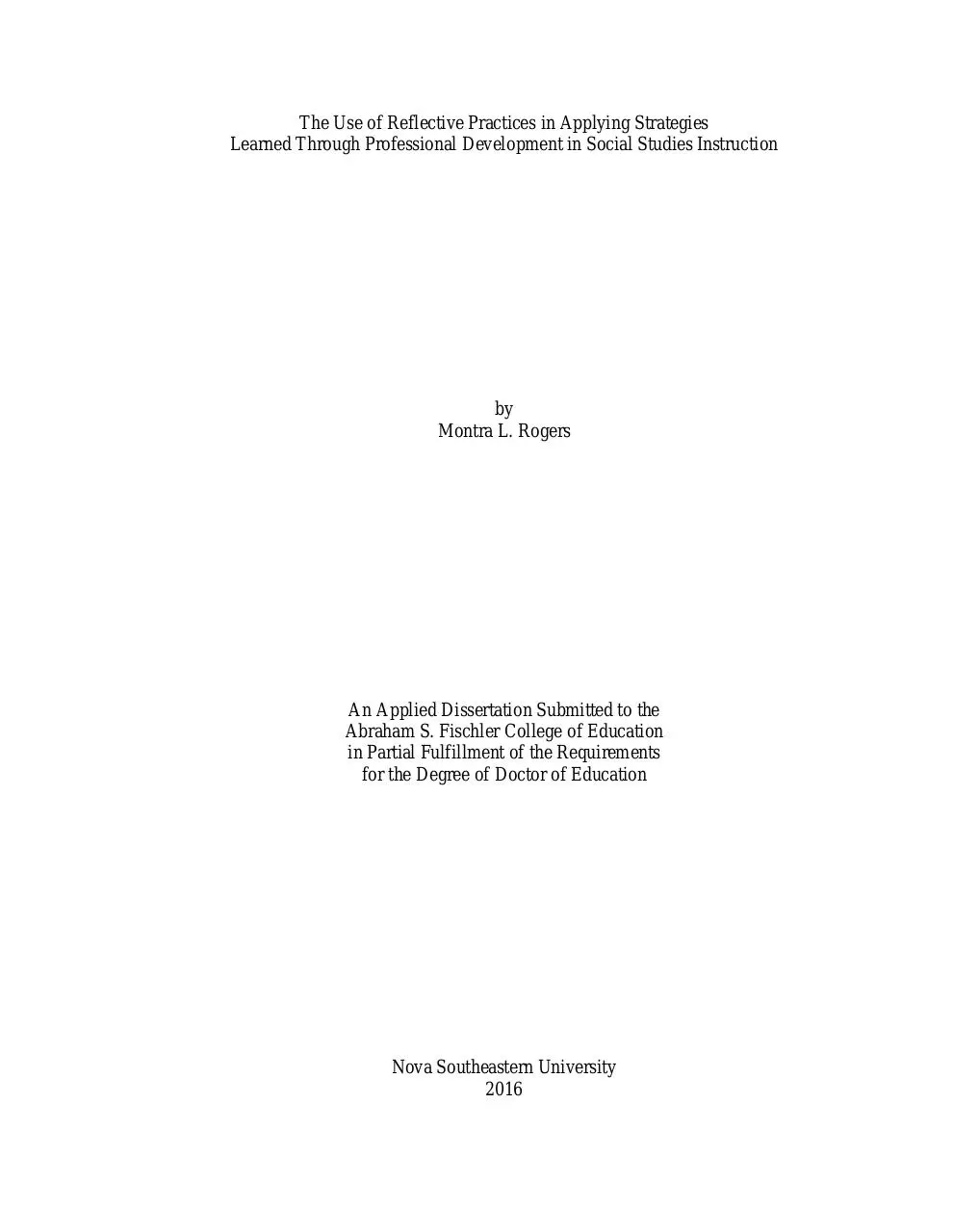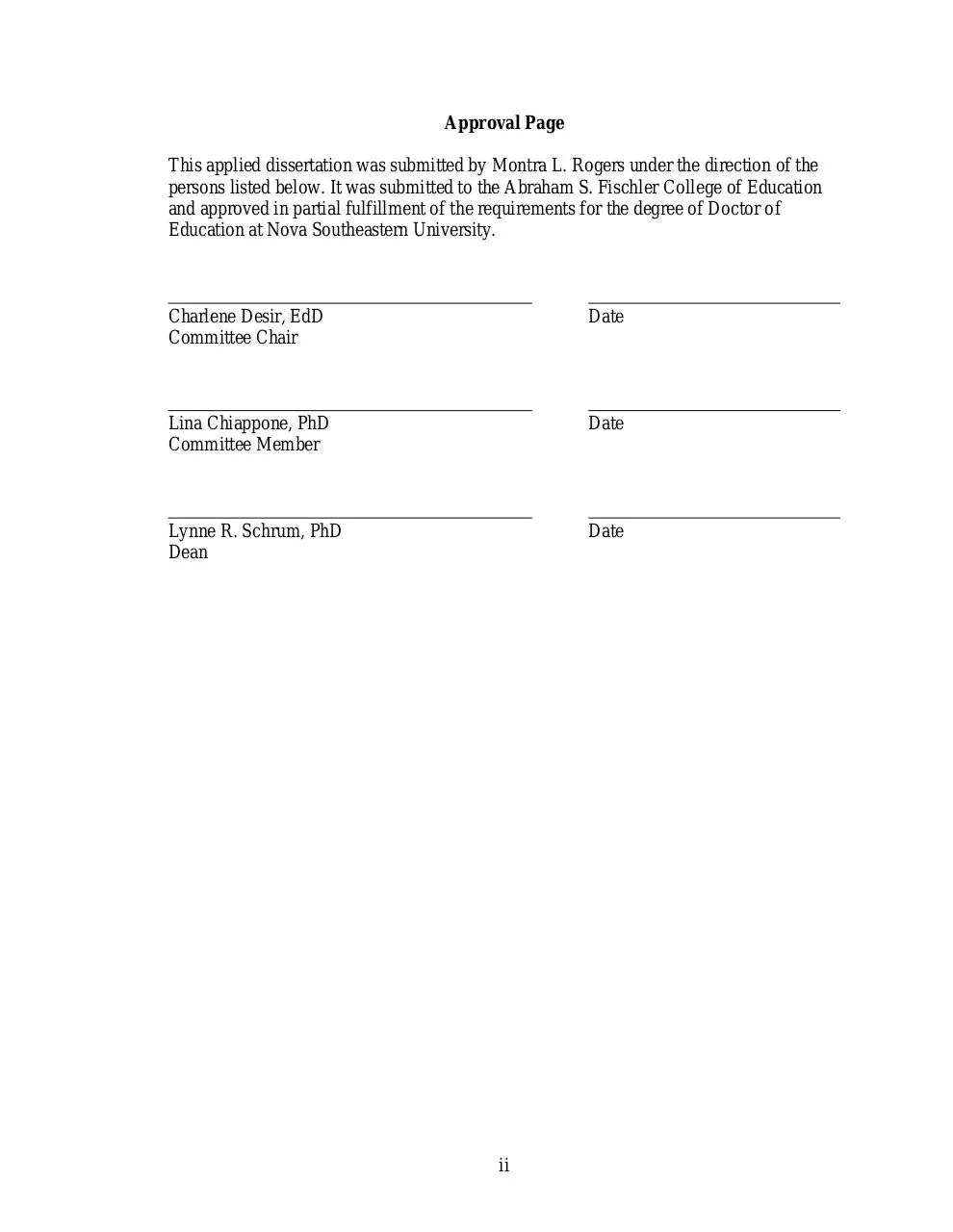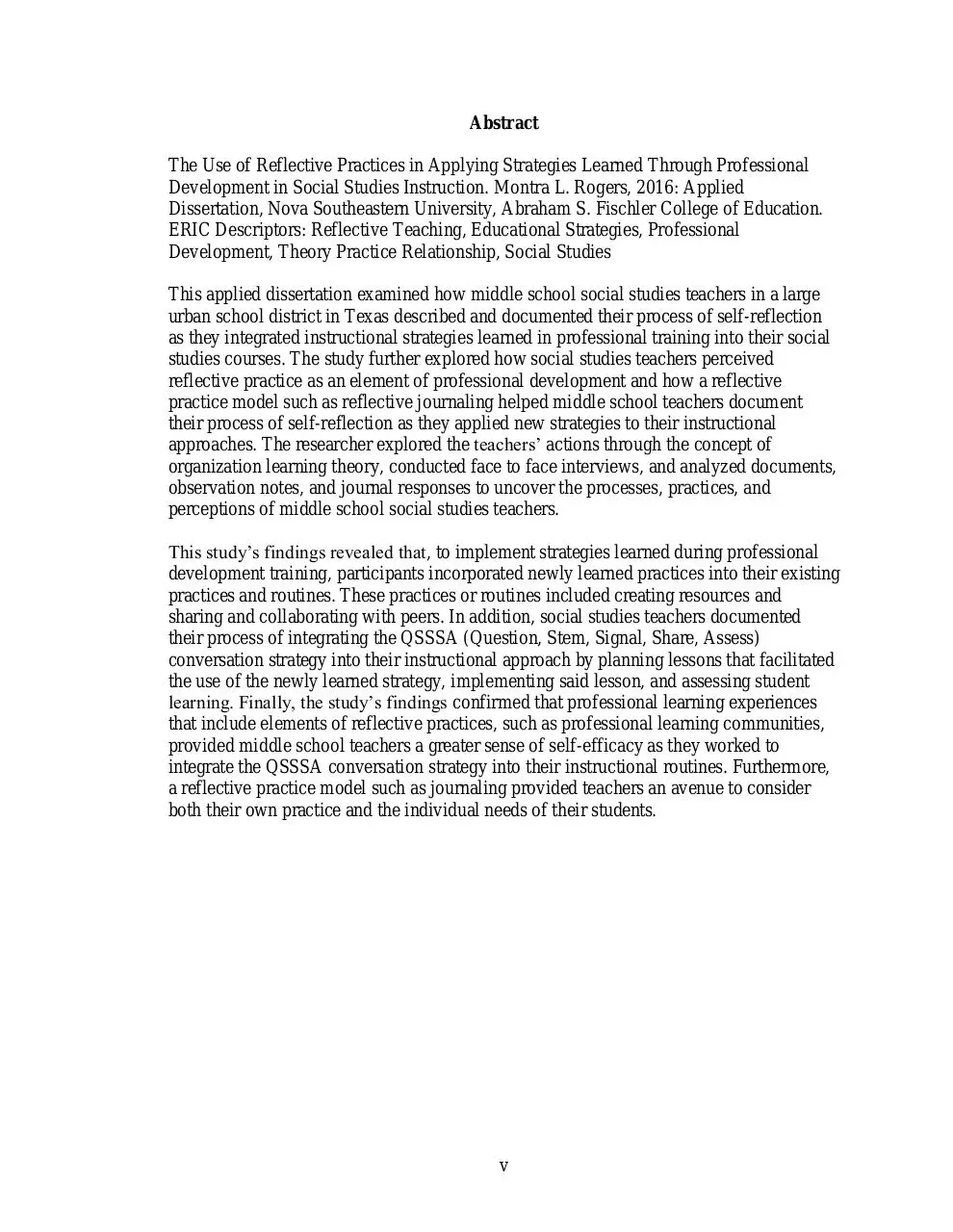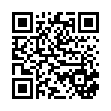Montra Rogers (PDF)
File information
Author: ARC (updated Oct. '09)
This PDF 1.5 document has been generated by Microsoft® Word 2010, and has been sent on pdf-archive.com on 29/03/2016 at 23:36, from IP address 71.164.x.x.
The current document download page has been viewed 898 times.
File size: 3.14 MB (154 pages).
Privacy: public file





File preview
The Use of Reflective Practices in Applying Strategies
Learned Through Professional Development in Social Studies Instruction
by
Montra L. Rogers
An Applied Dissertation Submitted to the
Abraham S. Fischler College of Education
in Partial Fulfillment of the Requirements
for the Degree of Doctor of Education
Nova Southeastern University
2016
Approval Page
This applied dissertation was submitted by Montra L. Rogers under the direction of the
persons listed below. It was submitted to the Abraham S. Fischler College of Education
and approved in partial fulfillment of the requirements for the degree of Doctor of
Education at Nova Southeastern University.
Charlene Desir, EdD
Committee Chair
Date
Lina Chiappone, PhD
Committee Member
Date
Lynne R. Schrum, PhD
Dean
Date
ii
Statement of Original Work
I declare the following:
I have read the Code of Student Conduct and Academic Responsibility as described in the
Student Handbook of Nova Southeastern University. This applied dissertation represents
my original work, except where I have acknowledged the ideas, words, or material of
other authors.
Where another author’s ideas have been presented in this applied dissertation, I have
acknowledged the author’s ideas by citing them in the required style.
Where another author’s words have been presented in this applied dissertation, I have
acknowledged the author’s words by using appropriate quotation devices and citations in
the required style.
I have obtained permission from the author or publisher—in accordance with the required
guidelines—to include any copyrighted material (e.g., tables, figures, survey instruments,
large portions of text) in this applied dissertation manuscript.
Montra L. Rogers
Signature
Montra L. Rogers
Name
March 14, 2016
Date
iii
Acknowledgments
I am most grateful for the opportunity and experiences this study afforded me and
for the chance to work with a phenomenal dissertation committee. I am especially
thankful to Dr. Desir - her expertise and candor was a true blessing.
My immediate family has encouraged me tremendously along this journey. I am
forever indebted to my mother Allene E. Davis. Although I was born with albinism, and I
am visually impaired, I was never allowed to think of myself as less than others. I am all
that I am because of her. At seventeen years old, I became a mother to my son, Matthew
J. Rogers. His twenty-eight year existence on this earth is the impetus for all that I do and
ever hope to accomplish. I also want to thank my grandmother, Annie Doris “Granny”
Rogers. I can never repay her for all she has done for me, and because of her selflessness
many years ago, this degree is a reality today. I would also like to extend a thank you to
my paternal uncles, Ellery, Lewis, and Donald, as well as my maternal aunt, Ruby, for
they have always served as role models. I am also grateful to my sisters, Sharla,
Vernique, Shondra, and Alexa, along with my two nieces and one nephew, Haley,
Chelsea, and Alexander, whose belief in me has always helped me believe in myself. I
am appreciative of my brother-in-law, Dr. Ostrova McGary, for patiently walking me
through chapters 1-5 time and time again. I must also acknowledge my companion, Mr.
Jaylynn M. Randle, for celebrating my milestones and encouraging me along the way.
I have to recognize the social studies community in the district in which I am
employed. I want to especially express gratitude to Angela, Mike, Cindy, Elena, Ian,
Kendra, Jill, Jamie, Hector, Kristal, Lachardra, Nelva, Tom, and the late Frank D.
Whiteside as they have supported me immensely from the very beginning.
iv
Abstract
The Use of Reflective Practices in Applying Strategies Learned Through Professional
Development in Social Studies Instruction. Montra L. Rogers, 2016: Applied
Dissertation, Nova Southeastern University, Abraham S. Fischler College of Education.
ERIC Descriptors: Reflective Teaching, Educational Strategies, Professional
Development, Theory Practice Relationship, Social Studies
This applied dissertation examined how middle school social studies teachers in a large
urban school district in Texas described and documented their process of self-reflection
as they integrated instructional strategies learned in professional training into their social
studies courses. The study further explored how social studies teachers perceived
reflective practice as an element of professional development and how a reflective
practice model such as reflective journaling helped middle school teachers document
their process of self-reflection as they applied new strategies to their instructional
approaches. The researcher explored the teachers’ actions through the concept of
organization learning theory, conducted face to face interviews, and analyzed documents,
observation notes, and journal responses to uncover the processes, practices, and
perceptions of middle school social studies teachers.
This study’s findings revealed that, to implement strategies learned during professional
development training, participants incorporated newly learned practices into their existing
practices and routines. These practices or routines included creating resources and
sharing and collaborating with peers. In addition, social studies teachers documented
their process of integrating the QSSSA (Question, Stem, Signal, Share, Assess)
conversation strategy into their instructional approach by planning lessons that facilitated
the use of the newly learned strategy, implementing said lesson, and assessing student
learning. Finally, the study’s findings confirmed that professional learning experiences
that include elements of reflective practices, such as professional learning communities,
provided middle school teachers a greater sense of self-efficacy as they worked to
integrate the QSSSA conversation strategy into their instructional routines. Furthermore,
a reflective practice model such as journaling provided teachers an avenue to consider
both their own practice and the individual needs of their students.
v
Table of Contents
Page
Chapter 1: Introduction ....................................................................................................... 1
Statement of the Problem ........................................................................................ 1
Definition of Terms................................................................................................. 8
Purpose of the Study ............................................................................................. 10
Chapter 2: Literature Review ............................................................................................ 12
Introduction ........................................................................................................... 12
Theoretical Perspectives ....................................................................................... 13
Education Reform: Teacher as Change Agent ...................................................... 13
Professional Development: A Vehicle for Education Change .............................. 18
Teacher Transfer: An Obstacle to Education Reform ........................................... 21
Reflective Practice ................................................................................................ 22
Teaching and Reflective Practice: Contributions and Thought ............................ 24
Reflective Journals ................................................................................................ 25
Social Studies: Purpose and Meaning ................................................................... 26
Creating Enlightened Citizens .............................................................................. 28
Studies on Reflective Practice .............................................................................. 29
Research Questions ............................................................................................... 31
Chapter 3: Methodology ................................................................................................... 33
Qualitative Research Approach ............................................................................ 33
Participants............................................................................................................ 34
Data Collection Tools ........................................................................................... 36
Procedures ............................................................................................................. 39
Data Analysis ........................................................................................................ 46
Ethical Considerations .......................................................................................... 47
Potential Research Bias......................................................................................... 48
Limitations ............................................................................................................ 50
Chapter 4: Findings ........................................................................................................... 52
Introduction ........................................................................................................... 52
Teacher Change Agents ........................................................................................ 53
Processes and Routines as an Impetus for Instructional Change .......................... 55
Planning, Teaching, and Assessing for Instructional Change............................... 61
Reflective Practice as a Vehicle for Instructional Change.................................... 74
Conclusion ............................................................................................................ 81
Chapter 5: Discussion ....................................................................................................... 83
Turning Points in Education ................................................................................. 84
Processes and Routines as an Impetus for Instructional Change .......................... 86
Planning, Teaching, and Assessing for Instructional Change............................... 89
Reflective Practice as a Vehicle for Instructional Change.................................... 96
Suggestions for Future Research ........................................................................ 101
vi
References ....................................................................................................................... 103
Appendices
A Pre Interview Template................................................................................ 111
B Post Interview Template .............................................................................. 113
C Invitation to PD............................................................................................ 115
D Reflective Journal Prompts .......................................................................... 117
E Professional Development Facilitation Guide and Supporting Material ..... 119
F Lesson Planning Template and Exemplar ................................................... 140
G Secondary Social Studies Observation Tool................................................ 146
Table
Demographics ....................................................................................................... 35
vii
1
Chapter 1: Introduction
Statement of the Problem
The Common Core State Standards (CCSS) Initiative dominates educational
discourse at national, state, and local levels. However, the effort to standardize what
students from kindergarten through twelfth grade should know and be able to do in
English/language arts and Mathematics has met some resistance. In Texas, the state in
which the study took place, elected officials passed legislation prohibiting the
implementation of Common Core State Standards. To summarize, the bill prohibits the
Texas State Board of Education from adopting national curriculum standards developed
by the Common Core State Standards Initiative. In addition, the order also prohibits a
school district from using Common Core State Standards to fulfil requirements to provide
instruction in essential knowledge and skills at appropriate grade levels, and it prohibits a
school district or open-enrollment charter school from being required to offer any aspect
of a common core state standards curriculum. Finally, the law prohibits the Texas
Education Agency from adopting or developing a statewide standardized test based on
CCSS (House Bill 462). State law prohibits Texas educators from implementing the
common core standards. However, the Common Core Standards Initiative, along with the
federal reforms that directly impact education in the state of Texas, have forced school
systems and education agencies around the country to seek solutions to improve teacher
quality (Marrongelle, Sztajn, & Smith, 2013; Petersen & Young, 2004).
How do we as a nation improve the quality of America’s teachers? Kent (2004)
suggested that staff development is the catalyst to reach this goal, as professional
development is the first step toward facilitating the transfer of theory into instructional
2
practices. Current staff development training models range from short-term traditional
training with few opportunities for follow-up or monitoring (Danielson & McGreal,
2000; Littky & Grabelle, 2004) to professional training that includes guided practice,
coaching, feedback, and reflection (Joyce & Showers, 2002; Zmuda, Kuklis, & Klein,
2004). Our current training models are inconsistent and are not successful; professional
development is not changing our fixed patterns of learning (Mancabelli, 2012). Teachers
are not transferring information from staff development training into instructional
approaches (Hill, 2009).
Phenomenon of interest. Reflective practice addresses the issue of transfer, that
is, the challenge of implementing strategies learned in professional development training
into instructional approaches. To be transformative, initiatives surrounding professional
development training must include elements of reflective practice to improve instruction
(Seed, 2008). Osterman and Kottkamp (1993) assert that reflective practice is based on
the belief that change begins with the individual and many barriers to change are rooted
in the unexamined beliefs that shape our behaviors. Creating change involves examining
behaviors, bringing unexamined thought processes to the forefront, and purposely selfmonitoring both behaviors and thought processes (Osterman & Kottkamp, 1993). By
gaining a better understanding of their practices through reflective practice, teachers are
likely to change their instructional habits (York-Barr, Sommers, Ghere, & Montie, 2004).
According to York-Barr et al. (2004) and Cooper and Boyd (1998), there are four
forms of reflective practice that lead to improved instruction and the professional growth
of teachers: (a) individual reflective practices, (b) partner reflective practices, (c) small
group reflective practices, and (d) large group reflective practices. There are many
Download Montra Rogers
Montra Rogers.pdf (PDF, 3.14 MB)
Download PDF
Share this file on social networks
Link to this page
Permanent link
Use the permanent link to the download page to share your document on Facebook, Twitter, LinkedIn, or directly with a contact by e-Mail, Messenger, Whatsapp, Line..
Short link
Use the short link to share your document on Twitter or by text message (SMS)
HTML Code
Copy the following HTML code to share your document on a Website or Blog
QR Code to this page

This file has been shared publicly by a user of PDF Archive.
Document ID: 0000354686.